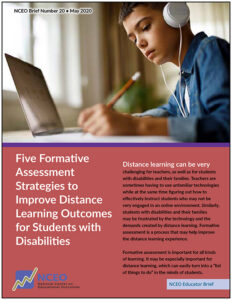 NCEO recently published Five Formative Assessment Strategies to Improve Distance Learning Outcomes for Students with Disabilities. This brief describes the use of formative assessment processes with students with disabilities during distance learning. Formative assessment is important for all kinds of learning, and especially focuses students on learning and evidence of learning.
NCEO recently published Five Formative Assessment Strategies to Improve Distance Learning Outcomes for Students with Disabilities. This brief describes the use of formative assessment processes with students with disabilities during distance learning. Formative assessment is important for all kinds of learning, and especially focuses students on learning and evidence of learning.
Formative assessment can be thought of as providing information that positions students in a formative learning cycle identified by three questions: Where am I going? Where am I now? Where to next? This is especially important in a distance learning environment where students sometimes struggle to orient to what they are learning.
This brief presents five strategies that can be used to support student understanding of their own learning during distance learning:
- Establish and communicate clear learning targets.
- Establish and communicate clear criteria for success.
- Build in opportunities for students to self-assess or ask questions, based on criteria.
- Give brief, clear, actionable feedback based on the criteria.
- Give students opportunities to revise assignments or re-do similar assignments.
The use of these strategies has the potential to be a powerful antidote to the “check-box” approach some students may bring to online learning where they focus on compliance with following directions and completing a list of assignments.
